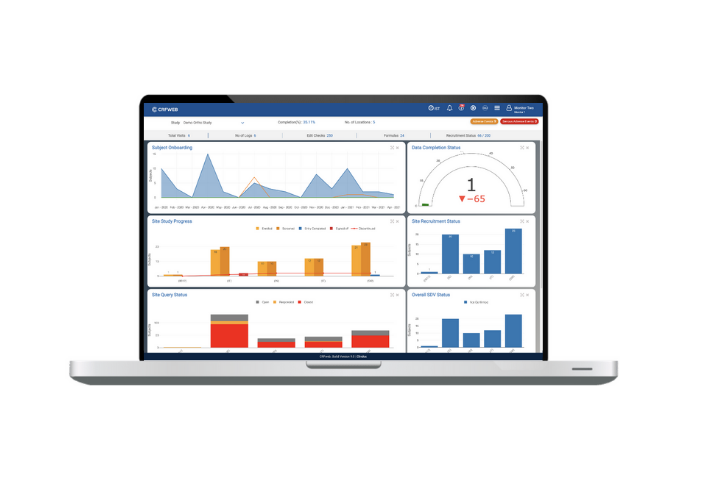The Clindox team looks back at the impact of Covid-19 in India and explores how the pandemic has affected important clinical trials work taking place in the country for Sars-Cov-2 vaccines and other therapeutic regimes.

This article will take a closer look at:
- The unique challenges facing India and the impact to date of the pandemic
- The current status of the vaccination campaign and vaccine availability in India
- How the pandemic has affected the conduct of clinical trials in India
- The role of Indian clinical organisations in delivering clinical trials for Covid-19 vaccines and therapies
India and the impact of Covid-19
India, as the world’s most populous democracy by far, faced unique difficulties as it grappled with Covid-19. With its huge land area, highly federal structure, largely rural population and vast number of migrant workers, controlling the spread of the virus was always going to be a monumental challenge. As of the end February 2022, India had recorded some 42.9 million cases with 514 thousand deaths and both figures are thought to be underestimates. Opinions have varied wildly about how well the pandemic was managed – in common with many other countries – but we can all surely be relieved about the rapid passing of the third wave, barely 8 weeks since it began. At its peak the average daily death rate was just over 1100, less than a quarter of the death rate at the peak of the second wave. The second wave also persisted for far longer – at least 5 months from mid-February ‘21 to the end of July, though infection rates did not return to mid-February levels until early November last year.
While it’s true that the low death rate and relatively short duration of the third wave are in no small measure due to the dominance of Omicron over the more deadly Delta variant that drove the second wave, the impact of public health measures – and in particular the vaccination programme –should not be underestimated.
India and the Covid-19 vaccination campaign
To date (end of Feb 2022), some 76% of eligible adults have been fully vaccinated and more than 99% have received at least one jab so far, a truly staggering and impressive national effort. Since 10 January 2021, India has been administering booster shots to healthcare and frontline workers, and those above 60 with comorbidities. Health authorities have also started vaccinating 15-18-year-olds since early January – more than 66% have now received a first dose. The vaccination campaign has used three vaccines Covishield (Astrazeneca), Covaxin made by the Indian firm Bharat Biotech and Russia’s Sputnik V. With some 85% of the doses given so far, the heavy lifting has been performed by Covishield. Additionally, India has approved another 6 vaccines for use, the latest being Sputnik Light (Feb 2022), which has been granted emergency use permission. In December both the Serum Institute of India’s Covovax and Biological E’s Corbevax were approved for emergency use, also. ZyCoV-D – the world’s first DNA vaccine against Covid-19 – manufactured by Indian firm Cadilla was also approved but it’s not available yet. Johnson & Johnson’s single-dose vaccine has also been approved (to be introduced in India via a supply agreement with Biological E) and Indian pharma company Cipla has been authorized to import the Moderna vaccine. It’s not clear though when either of the J&J or Moderna vaccines will be available. The Pfizer/BioNTech vaccine, while also approved for use, will not be bought by the Indian Government due to cost and the difficulties of ultra-low temperature storage.
As well as vaccines there are a number of antiviral treatments for Covid-19 available on the Indian market and treatments based on traditional medicines have been approved to help manage the impact of the virus. In August 2021, the Government of India released “National Clinical Management Protocol based on Ayurveda and Yoga for Covid 19 management” prepared by the National Task force in consensus from various expert committees.
Covid-19 and the impact on clinical trials in India
As of Feb 2022, 34 vaccines are now available worldwide, though of course, they have not all been cleared for use in all countries, yet. Astonishingly, this is the tip of the iceberg. The WHO Novel Covid-19 Vaccine Tracker (23 Feb 2022) reports that 145 vaccine candidates are in the clinical trials phase and a further 195 are in the pre-clinical development phase. The search for new treatments, not simply vaccines, is accelerating. And, of course, we need this. Simply because the dominant strain worldwide (Omicom) is less severe, it does not mean that it does not cause severe disease. It means that it causes severe disease far less often, but this is counterbalanced by the fact that it is way more infectious. We are not out of the woods yet, by a long way, and this is particularly true for countries in the developing world where vaccination rates remain low. While vast numbers of people remain unvaccinated there is always the possibility of a novel variant emerging that is yet more infectious and more lethal.
Yet, Covid -19 has had a significant impact on medical and clinical research worldwide. More than 2000 trials registered on the key US resource ClinicalTrials.gov were terminated because of the difficulties of undertaking research during the pandemic. India, with its huge caseload, was particularly beset by these problems.
In a laudable attempt to accelerate research during the COVID-19 pandemic, the Indian Council of Medical Research had approved a joint review of multi-centre research by a single nationally designated and approved ethics committee to fast-track decision making. However, sponsors have often been frustrated by the refusal of many hospital ethics committees to accept the reviews of this central committee, insisting that their regular, formal processes be followed. Under extraordinary resource and staffing pressure caused by the pandemic, these processes were frequently spasmodic and subject to lengthy delays. Furthermore, despite the existence of a common forms template from the Indian Council of Medical Research for submissions for ethical approval, many sites continued to insist on receiving applications in their respective templates, again adding to delays in approval.
To compound these problems, a substantial number of ethics committees did not differentiate between academic-led and industry-led trials despite the New Drugs and Clinical Trial Rules of 2019 granting exemption for non-regulatory academic trials of repurposed drugs. This again led to delays due to demands for approval from the Drug Controller General of India.
More generally, pandemic-imposed travel barriers or concern with having tests at health-care facilities during the peak pandemic period have led to unusually high patient drop-out numbers as did the fear of testing positive for COVID-19. Not only were there understandable health concerns about contracting the disease, there was also the problem of reported discrimination to contend with. The stigma of having the virus or as being seen to be at high risk of contracting Covid-19 impacted significantly on recruitment rates for many trials.
Since the beginning of 2021, there had been no less than 86 Covid-19 related clinical trials registered in India, of which 48 have yet to start recruiting subjects.

The role of Indian clinical organisations, and CRFWEB in delivering clinical trials for Covid-19 vaccines and therapies
Despite these challenges, India remains very much in the vanguard of the search for new and effective treatments for Covid-19. Clindox is delighted to be supporting 4 current Covid-19 studies in India (plus 1 recently concluded):
- A retrospective, multicentre, observational study on PCR kit
- Study to evaluate the efficacy and safety of an adjuvant therapy: Multicenter, double-blind, placebo-controlled, 6 sites in India, over 200 subjects
- A health supplement as an element in a standard care and management regime for recovered subjects.
- Sector specific Respiratory Study: 25 sites with 1600 subjects.
- A Phase II safety and efficacy study on the response to therapy in COVID subjects. 5 sites 100+ subjects.
The use of CRFWEB is these studies is not only a resounding vote of confidence in our product, its also a strong testament to the quality and commitment of our local Software Development and Professional Services teams based in Pune.
It is probably true that in the longer run Covid-19 will most likely become endemic and largely innocuous, but achieving this natural equilibrium will take several years at the very least. In the shorter term, there is no reason at all to assume that matters could not take a serious turn for the worse, and very quickly too, should we draw the short straw in the Covid -19 evolutionary lottery. We need all the effective tools we can lay our hands on as soon as they are safely available and India will undoubtedly continue to play a key role in this unprecedented global effort.
Covid-19 and the future of clinical trials
For three transparently and fully trialed vaccines to have been ready for widespread deployment within a year of the pandemic beginning is nothing short of miraculous. A development lifecycle that could easily have taken a decade (or longer) had been compressed into barely a tenth of that time. Of course, having essentially unlimited resources at hand coupled with the intense and unbending focus of the world’s most technologically advanced nations meant that many of the usual, prosaic barriers to progress were simply brushed aside. However, there is no doubt that there has been a paradigm shift; a recognition that it is possible to deliver effective, safe medicines far more quickly than anyone had previously believed possible. This new Age of Speed has emphatically not thrown out the need to design, operate and analyze clinical trials according to well understood epidemiological principles, but we need to get used to doing more, more quickly. As has been discussed at great length in this article and elsewhere, the pandemic has also had a significant impact on the progress of a large number of clinical trials by having made it very hard for subjects to attend study centres. To counter this problem, there has been renewed enthusiasm for decentralized clinical trials (DCTs) and hybrid trials that minimize study centre visits. DCTs have much to offer as a methodology by reporting on how subjects use pharma or medtech interventions naturally in their own homes, and for many medicines and medical devices, they are probably preferable over more classical trial protocols. This trend is discussed in greater depth in our January article: Decentralized Clinical Trials – new kid on the block or a venerable idea resurrected?
The bottom line is that DCTs and hybrid trials are all but impossible without sophisticated EDC platforms. Virtually all pharma trials now deploy EDC nowadays in any event, but the trend toward the adoption of these remote clinical trial protocols will mean that most medical device manufacturers will now need to deploy EDC, too, if they wish to undertake decentralized or hybrid clinical trials to gain or maintain market access.
The pandemic has very definitely led to fantastic innovation and a willingness to challenge prevailing wisdom, but here we are really only witnessing no more than an accelerated progression along an inevitable trajectory. This direction of travel is fundamentally set by the growing need to gather data that will support more rigorous evidential standards for safety and efficacy over the whole lifetime of a device. Amen to that.
How Clindox can help you
Clindox has a natural advantage over many of our competitors as we can leverage the benefits of:
– Long established, low cost-base development and support centres of the highest calibre
– High degree of sponsor self-sufficiency for study builds (with cost-effective client onboarding processes and expert support as required)
– Solution stack delivered through a simple, flexible SaaS model
Objectively, cost-plus – the true driver obscured by the smoke and mirrors of pricing plans – favours our offer and to this end you will find our proposals will be far simpler than any of our competitors and notable by the absence of arbitrary, hard-to-justify significant variability.
All in all, we know that with our low cost-base and our ongoing commitment to self-sufficiency, simplicity and transparency, we will always provide an excellent value proposition without compromising on features or quality… whichever sector you’re from, and whatever your study or investigation needs are.










